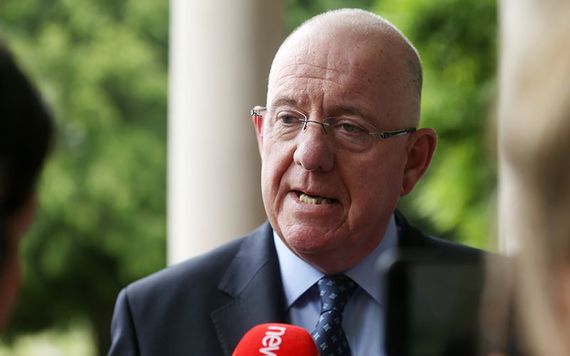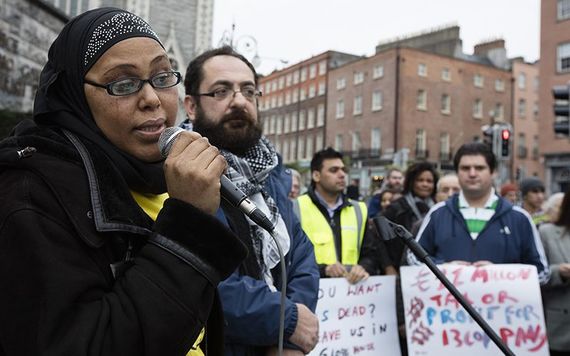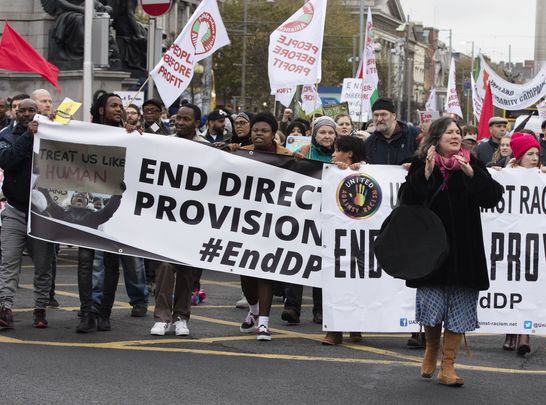So how racist are the Irish? The two-week confrontation in the small Co. Galway town of Oughterard over a proposed migrant center has again raised the question.
The promoter announced on Tuesday that he was abandoning the plan, which is a victory for the local people. But the question remains: how racist are the Irish?
If you're late to this story -- one that has been making emotive headlines in Ireland -- it began a few weeks ago when people in Oughterard noticed there was a lot of work going on at a hotel on the outskirts of the town, a hotel which has been closed for a decade or so. If the once-popular Connemara Gateway Hotel was being reopened it would be a welcome boost for tourism in the area.
Read more: Small towns bear brunt of Irish asylum system
Oughterard is on Lough Corrib, even by Galway standards a very beautiful area which is also famous for fishing especially at mayfly time when the trout go crazy for the insects dancing over the water.
As someone who has been going there for the mayfly fishing for over 30 years, I know the town and its people well. And I remember the Connemara Gateway from its heyday before the hotel began to struggle and eventually closed.
If it was reopening, that had to be good news for the town. Even though tourism is doing well nationally in Ireland, small towns like Oughterard can find it difficult to generate year-round business. So the reopening of the hotel would be a significant boost for the area.
Secrecy of Direct Provision
However, there had been no announcement and the secrecy which surrounded the work that had started behind closed gates raised suspicions that it had nothing to do with tourism. Locals became concerned about what was actually happening was the hotel was being converted into a Direct Provision center to house asylum-seeking migrants. And when they asked officialdom they were given the runaround.
To say this situation came as a shock is an understatement. Oughterard has a population of around 1,300. The word quickly spread around the area that the hotel was to house up to 250 immigrants.
Clearly that would have a significant impact on the town and its character and seemed to be way out of proportion. Added to that was the fact that no one had asked the people of Oughterard if they were happy with the plan.
As usual with our Direct Provision system, everything was being done in secret, directed by state officials in Dublin. Local people would not be consulted until contracts had been signed with the hotel owners and the new immigrant center was a reality that could not be reversed. Once it was up and running they would be guilt-tripped into supporting it and the new arrivals.
Anger in Oughterard
In Oughterard, people were fearful and furious, so angry that more than 800 of them turned up for a meeting just over two weeks ago. There was almost unanimous opposition to the plan.
Speaker after speaker said it was too much. Fears were expressed that most of the immigrants would be young men. With no jobs available and poor public transport links to Galway and elsewhere, they would be stuck in the town. What would they do all day?
If there were families among the immigrants they would also find it difficult, the meeting was told. There is only one doctor in Oughterard who already has a full patient list, and both the primary and secondary schools are full.
There are no support facilities for migrants in the area. And there is no longer a garda station in the town -- the nearest one is miles away.
All of this was aired at the meeting, but what really made the headlines the next day were the remarks to the meeting made by the independent Dail TD Noel Grealish who is one of the representatives in the area.

Dail TD Noel Grealish.
In the heat of the meeting, Grealish said that many asylum seekers who come here are really economic migrants, and he referred to African migrants who "sponge off the system." This was widely condemned by media commentators and politicians in the following days as racist. And when local people held a mass protest march two weeks ago in Oughterard, that also attracted accusations that racism was the unspoken but underlying motivation behind it.
Rather than make this accusation directly, many commentators suggested that the people of Oughterard were being manipulated by outside activists from far-right groups who oppose all migration. This was repeated last weekend when a second mass protest march was held from the town to the hotel. And it is being used to criticize the locals who have been mounting a protest picket outside the hotel around the clock since the controversy began over two weeks ago.
Apart from being insulting to the people of the town, this is obvious nonsense. It is quite likely that the confrontation has attracted some right-wing nutters.
But to suggest that local people are being manipulated makes no sense since almost the entire town attended the initial meeting and around 2,000 people from the town and the surrounding area took part in the two protest marches.
The numbers involved clearly demonstrate the strength of feeling about the situation.
Talking down to the locals
Particularly nauseating over the past two weeks has been the patronizing waffle from various leaders from President Michael D. Higgins down about the traditional generosity of the Irish people, the benefits of multiculturalism, the contribution that immigrants make to communities, our own history of migration, and the duty of the country to play its part in dealing with the migrant crisis in Europe.
The Minister for Justice Charlie Flanagan was also at it (his department has responsibility for running the system), talking about sinister elements stirring up unnecessary fears. But neither he nor the president talked about the real issue -- the way the Direct Provision system ignores the right of local people to decide what happens in their area.
Read more: Ireland's Minister for Justice responds to Direct Provision criticisms

Minister for Justice Charlie Flanagan.
At this stage, the system has little credibility left. There are over 30 of these centers around the country, many of them in failed hotels in small towns where they are a lucrative way out for the owners.
All kinds of vague promises of state support are made to the local community when a center opens but little happens subsequently. Basically local people are left to cope as best they can.
Reality of existence in Direct Provision
Although the law was changed recently to allow asylum seekers to work, that makes little difference in rural towns where there are no jobs. The migrants are housed and fed and given a weekly allowance of just under €40 per adult and €30 per child.
It's a miserable existence, made worse by being in a strange place with nothing to do and by overcrowding. Typically families or several single people who may not know each other have to live in one room -- in Oughterard, the locals believe there will be up to five in a room if the hotel opens as a center.
In some areas attempts have been made to open centers despite strong local opposition -- this has led to two incidents in which hotel buildings have been set on fire in the past few years in towns in Donegal and Leitrim. The same accusations of racism were made at the time, including by well-off people living in the leafier parts of the capital where a center was stopped recently by legal challenges. Those with the most liberal views on this issue are often a comfortable distance away from where the migrants are being housed -- in Dublin most of the new arrivals end up in the poor inner-city area, for example.

Another Direct Provision protest.
The truth about all this is that the Direct Provision system is not working. It's an effective and cheap way in which the state and its leaders and officials have been dumping a problem on local people. And they have been doing so without any warning or consultation, using the spurious argument that until contracts are signed they are precluded from revealing anything.
You don't have to be a right-wing nutter to know this is a lie -- the real reason is they know that people in many towns would oppose the arrival of a migrant center if they had the chance.
So the views of local people are ignored, which is extraordinary in a democracy when you think about it. Realizing the way public tolerance on this has shifted, the bishop in Galway last weekend called for advance consultation and said the Department for Justice must start trusting local people. He said much more would have to be spent by the state on social infrastructure and supports if these centers were to be welcomed into towns. He's a bit late with that but he's right.
The people of Oughterard have made it clear that they are willing to welcome a couple of migrant families into the town if they are properly housed and supported and can become part of the community. And of course, that is the solution to this issue nationally -- a couple of migrant families who are genuine asylum seekers being housed in every town in the country, rather than 250 migrants being dumped in an isolated area that happens to have an abandoned hotel.
There is very little sign of this happening, however, not least because it would be difficult and expensive for the department to organize. Instead, the state is continuing to take the easy way out, ignoring local people or lying to them about decisions that have already been made.
One of the reasons is the pressure the department is under. There are around 6,000 asylum seekers in the system here waiting for a decision on their cases, most of them living in Direct Provision centers.
But there has been an increase in numbers arriving recently and all the existing centers are full, so hundreds are now being housed in "emergency accommodation" in ordinary hotels and B&Bs, which is very expensive. As far as the state is concerned there is an urgent need for more Direct Provision centers around the country.
The other problems here are our poor performance in deporting those who obviously are not genuine asylum seekers fleeing war-torn countries and delays in the decision-making process which has seen many migrants remaining in Direct Provision for years.
Last week Flanagan said the decision time has now been reduced to less than two years. But the reality is that this is then followed in very many cases by several years of legal appeals and a judicial review. The legal profession here has turned the situation into a mini-industry funded by the taxpayer.
Back to Grealish and the accusations of racism against him and the people of Oughterard. Obviously saying all African migrants are "spongers" is racist. He should not have said that.
But as we all know from the pictures of packed migrant boats on the Mediterranean, the majority are from sub-Saharan Africa and other countries like Ethiopia or Somalia and are economic migrants in search of a better life rather than people fleeing war. If that was the point he was trying to make he was correct, even if he did it in a way that is unacceptable.
And are the people of Oughterard racist? Of course not. They're as generous and caring as people all over Ireland. They will go out of their way to help anyone in trouble.
They're not racist. But they're not stupid either.
Read more: Kerrygold, Irish whiskey and Baileys hit with new 25% tariff by United States




Comments